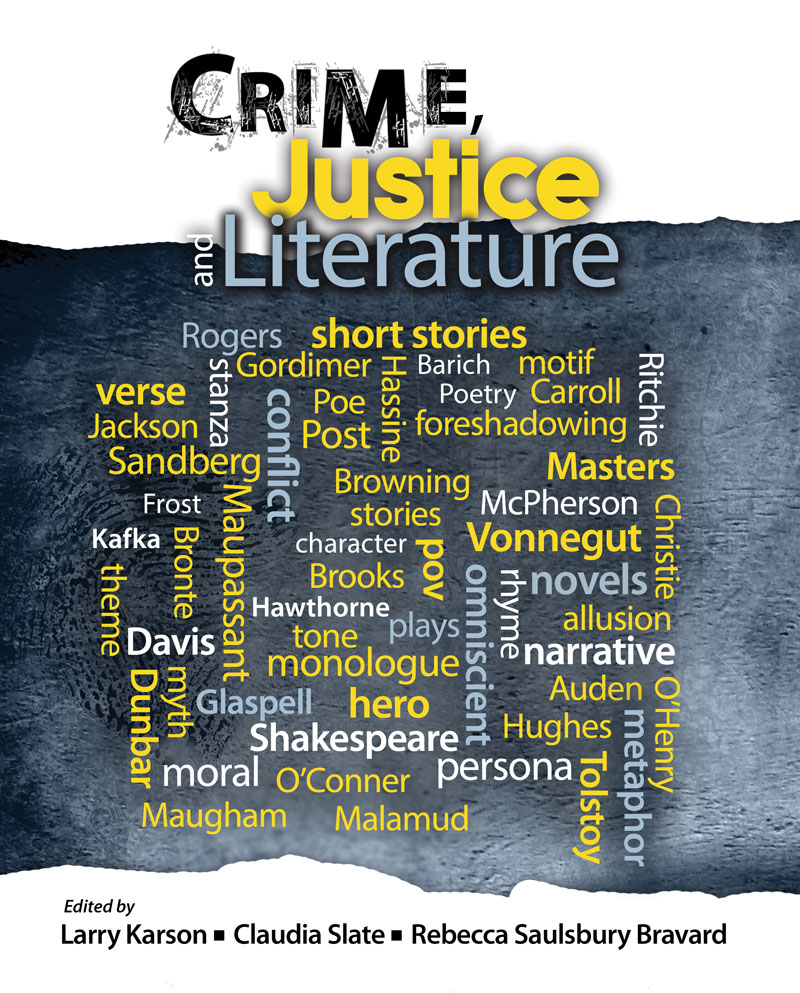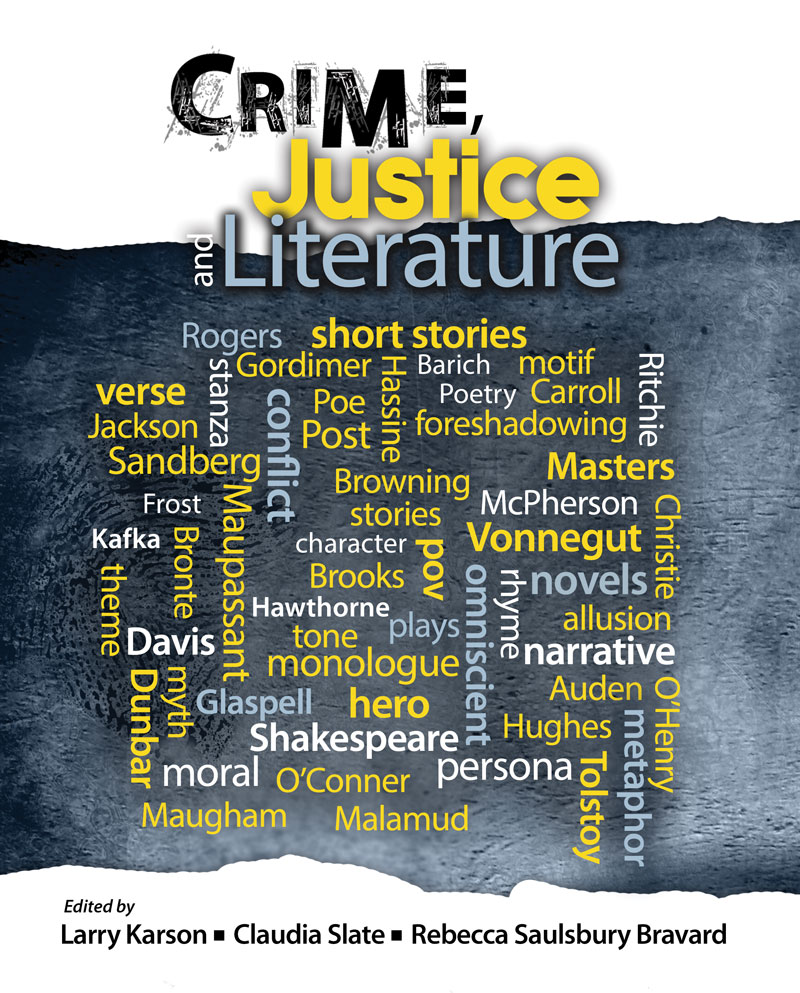Crime, Justice and Literature
Author(s): Lawrence Karson , Claudia Slate , Saulsbury Rebecca
Edition: 1
Copyright: 2017
Pages: 322
The criminal justice system is about storytelling: by the victim, the suspect, the officer, the prosecutor, and the defense attorney. For many the justice system is not necessarily about justice or fairness: it may simply be about whose story is believed.
Crime, Justice, and Literature: A Reader emphasizes storytelling by using literature as a tool to help students understand the theories, concepts and models taught in an introductory criminal justice class. Recognizing that criminal justice is an interdisciplinary field, Crime, Justice, and Literature uses short stories and poetry to integrate seamlessly the humanities into the criminal justice core.
Introduction
SECTION 1 Overview of the Criminal Justice System
Chapter 1 Introduction to Criminal Justice
What Is Crime?
“The Hill” and “Hod Putt” from Spoon River
Anthology—Edgar Lee Masters
History of the Criminal Justice System in America
“Mrs. Hutchinson”—Nathaniel Hawthorne
Chapter 2 Criminal Behavior
Routine Activities Theory
“The Purloined Letter”—Edgar Allan Poe
Sociological Theories of Crime: Subcultural Theory
“Some of Us Have Been Threatening Our
Friend Colby”—Donald Barthelme
Sociological Theories of Crime: General Theory of Crime
“My Last Duchess” and “Porphyria’s Lover”—Robert Browning
Sociological Theories of Crime: Differential Association
and Learning Theory
“Barn Burning”—William Faulkner
Sociological Theories of Crime: Social Control Theory
“For All the Rude People”—Jack Ritchie (John George Reitci)
Chapter 3 Criminal Law
Defenses—Necessity
“Rosalie Prudent”—Guy de Maupassant
Policy Choices, Politics, and Ideology
“Before the Law” and “The Problem of Our Laws”—Franz Kafka
SECTION 2 The Policing of Crime
Chapter 4 The Policing of Crime
History of Policing in the United States
“Andy the Night-Watch,” “The Town Marshal,”
and “Jack McGuire” from Spoon River
Anthology—Edgar Lee Masters
Policing in the South: Conflict Theory, Mob Violence,
Vigilantism, Lynch Mob
“A Party Down at the Square”—Ralph Ellison
“The Lynching of Jube Benson”—Paul Dunbar
* “Bronzeville Mother Loiters in Mississippi. Meanwhile, a Mississippi
Mother Burns Bacon” and * “The Last Quatrain of the
Ballad of Emmett Till”—Gwendolyn Brooks
Local and State-Level Policing: Homelessness
“The Death of the Hired Man”—Robert Frost
Local and State-Level Policing: LGBT Profiling
“Café: 3 am” (1951)—Langston Hughes
Local and State-Level Policing: Racial Unrest
“Death in Yorkville (James Powell,
Summer, 1964)”—Langston Hughes
Chapter 5 Policing: Roles, Functions, and Challenges
Controversial Police Roles
* “The Majesty of the Law”—Frank O’Connor (Michael
Francis O’Donovan)
Order Maintenance
* “Shooting an Elephant”—George Orwell (Eric Arthur Blair)
Undercover Investigations: Ethical Issues
“Crimes of Conscience”—Nadine Gordimer
Authoritarianism
* “An Apology”—Bernard Malamud
Cynicism
“Hardened”—Stephen D. Rogers
Police Discretion
“The Hidden Law”—W. H. Auden
Police Discretion: Friends and Family
“After Twenty Years”—O. Henry (William Sydney Porter)
SECTION 3 The American Court System
Chapter 6 The Court System
Presumption of Innocence?
Alice’s Adventures in Wonderland—an excerpt—Lewis
Carroll (Charles Lutwidge Dodgson)
Ethics and Professionalism: Vagrancies of Justice
* “An Act of Prostitution”—James Alan McPherson
“The Lottery”—Shirley Jackson
Chapter 7 Inside a Courtroom
Witness Testimony
* “Witness for the Prosecution”—Agatha Christie
The Prosecution and the Defense
“The Lawyers Know Too Much”—Carl Sandberg
“The Lawyer’s Ways”—Paul Laurence Dunbar
The Defense
“The Corpus Delicti”—Melville Post
Ethics and Professionalism: Defense Attorneys
* “The Letter”—W. Somerset Maugham
The Jury: Deliberations and Beyond
* “Beyond Any Doubt”—Robert O’Neil Bristow
Chapter 8 Sentencing and Judgment
Goals of Sentencing
Merchant of Venice—“Quality of Mercy” Speech
—William Shakespeare
Types of Sentences 209
* “A Wasted Day”—Richard Harding Davis
To Execute or Not to Execute
“Too Dear!”—Leo Tolstóy
Race and Gender: Class
* “Happy Event”—Nadine Gordimer
SECTION 4 The Consequences of Crime: Corrections
Chapter 9 Prisons and Jails
Corrections
“The Cop and the Anthem”—O. Henry (William Sydney Porter) 231
Chapter 10 Prison Life
Adjusting to Prison Life
“The Beast”—Victor Hassine
“The Prisoner”—Elizabeth Browning
Female Inmates
“The Prisoner: A Fragment”—Emily Bronte
Chapter 11 Special Issues in Corrections
Return to Society
“The Prison Librarian”—Sonia Tabriz and Victor Hassine
SECTION 5 Special Topics in Criminal Justice
Chapter 12 Juvenile Justice
Delinquency
* “We Real Cool”—Gwendolyn Brooks
* “Thank You, Ma’am”—Langston Hughes
Problematic Issues in Juvenile Justice
“Hard to Be Good”—Bill Barich
Chapter 13 Victimology and Victim’s Rights
The Path from V ictim Justice System
to Criminal Justice System
“A Jury of Her Peers”—Susan Glaspell
“Closure”—Stephen D. Rogers
Chapter 14 Future of Criminal Justice
Case Study
“Harrison Bergeron”—Kurt Vonnegut, Jr.
The criminal justice system is about storytelling: by the victim, the suspect, the officer, the prosecutor, and the defense attorney. For many the justice system is not necessarily about justice or fairness: it may simply be about whose story is believed.
Crime, Justice, and Literature: A Reader emphasizes storytelling by using literature as a tool to help students understand the theories, concepts and models taught in an introductory criminal justice class. Recognizing that criminal justice is an interdisciplinary field, Crime, Justice, and Literature uses short stories and poetry to integrate seamlessly the humanities into the criminal justice core.
Introduction
SECTION 1 Overview of the Criminal Justice System
Chapter 1 Introduction to Criminal Justice
What Is Crime?
“The Hill” and “Hod Putt” from Spoon River
Anthology—Edgar Lee Masters
History of the Criminal Justice System in America
“Mrs. Hutchinson”—Nathaniel Hawthorne
Chapter 2 Criminal Behavior
Routine Activities Theory
“The Purloined Letter”—Edgar Allan Poe
Sociological Theories of Crime: Subcultural Theory
“Some of Us Have Been Threatening Our
Friend Colby”—Donald Barthelme
Sociological Theories of Crime: General Theory of Crime
“My Last Duchess” and “Porphyria’s Lover”—Robert Browning
Sociological Theories of Crime: Differential Association
and Learning Theory
“Barn Burning”—William Faulkner
Sociological Theories of Crime: Social Control Theory
“For All the Rude People”—Jack Ritchie (John George Reitci)
Chapter 3 Criminal Law
Defenses—Necessity
“Rosalie Prudent”—Guy de Maupassant
Policy Choices, Politics, and Ideology
“Before the Law” and “The Problem of Our Laws”—Franz Kafka
SECTION 2 The Policing of Crime
Chapter 4 The Policing of Crime
History of Policing in the United States
“Andy the Night-Watch,” “The Town Marshal,”
and “Jack McGuire” from Spoon River
Anthology—Edgar Lee Masters
Policing in the South: Conflict Theory, Mob Violence,
Vigilantism, Lynch Mob
“A Party Down at the Square”—Ralph Ellison
“The Lynching of Jube Benson”—Paul Dunbar
* “Bronzeville Mother Loiters in Mississippi. Meanwhile, a Mississippi
Mother Burns Bacon” and * “The Last Quatrain of the
Ballad of Emmett Till”—Gwendolyn Brooks
Local and State-Level Policing: Homelessness
“The Death of the Hired Man”—Robert Frost
Local and State-Level Policing: LGBT Profiling
“Café: 3 am” (1951)—Langston Hughes
Local and State-Level Policing: Racial Unrest
“Death in Yorkville (James Powell,
Summer, 1964)”—Langston Hughes
Chapter 5 Policing: Roles, Functions, and Challenges
Controversial Police Roles
* “The Majesty of the Law”—Frank O’Connor (Michael
Francis O’Donovan)
Order Maintenance
* “Shooting an Elephant”—George Orwell (Eric Arthur Blair)
Undercover Investigations: Ethical Issues
“Crimes of Conscience”—Nadine Gordimer
Authoritarianism
* “An Apology”—Bernard Malamud
Cynicism
“Hardened”—Stephen D. Rogers
Police Discretion
“The Hidden Law”—W. H. Auden
Police Discretion: Friends and Family
“After Twenty Years”—O. Henry (William Sydney Porter)
SECTION 3 The American Court System
Chapter 6 The Court System
Presumption of Innocence?
Alice’s Adventures in Wonderland—an excerpt—Lewis
Carroll (Charles Lutwidge Dodgson)
Ethics and Professionalism: Vagrancies of Justice
* “An Act of Prostitution”—James Alan McPherson
“The Lottery”—Shirley Jackson
Chapter 7 Inside a Courtroom
Witness Testimony
* “Witness for the Prosecution”—Agatha Christie
The Prosecution and the Defense
“The Lawyers Know Too Much”—Carl Sandberg
“The Lawyer’s Ways”—Paul Laurence Dunbar
The Defense
“The Corpus Delicti”—Melville Post
Ethics and Professionalism: Defense Attorneys
* “The Letter”—W. Somerset Maugham
The Jury: Deliberations and Beyond
* “Beyond Any Doubt”—Robert O’Neil Bristow
Chapter 8 Sentencing and Judgment
Goals of Sentencing
Merchant of Venice—“Quality of Mercy” Speech
—William Shakespeare
Types of Sentences 209
* “A Wasted Day”—Richard Harding Davis
To Execute or Not to Execute
“Too Dear!”—Leo Tolstóy
Race and Gender: Class
* “Happy Event”—Nadine Gordimer
SECTION 4 The Consequences of Crime: Corrections
Chapter 9 Prisons and Jails
Corrections
“The Cop and the Anthem”—O. Henry (William Sydney Porter) 231
Chapter 10 Prison Life
Adjusting to Prison Life
“The Beast”—Victor Hassine
“The Prisoner”—Elizabeth Browning
Female Inmates
“The Prisoner: A Fragment”—Emily Bronte
Chapter 11 Special Issues in Corrections
Return to Society
“The Prison Librarian”—Sonia Tabriz and Victor Hassine
SECTION 5 Special Topics in Criminal Justice
Chapter 12 Juvenile Justice
Delinquency
* “We Real Cool”—Gwendolyn Brooks
* “Thank You, Ma’am”—Langston Hughes
Problematic Issues in Juvenile Justice
“Hard to Be Good”—Bill Barich
Chapter 13 Victimology and Victim’s Rights
The Path from V ictim Justice System
to Criminal Justice System
“A Jury of Her Peers”—Susan Glaspell
“Closure”—Stephen D. Rogers
Chapter 14 Future of Criminal Justice
Case Study
“Harrison Bergeron”—Kurt Vonnegut, Jr.

